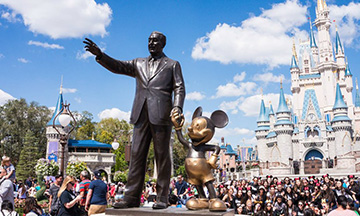
La caída de Disney
Disney’s Fall
Aunque Walt Disney fue un gran soñador y empresario es probable que no anticipara la trascendencia planetaria que tendría su trabajo. Pero es mucho más probable que no anticipara su caída.
Lo cierto es que, a finales de 2020, el gigante del ocio y entretenimiento anunció pérdidas netas de 2.864 millones de dólares al cierre de su año fiscal, sólo atribuibles —según ellos— al impacto de la pandemia. Y agregaron unos días después que estaban listos para despedir por esta razón a 32.000 de sus empleados en todo el mundo.
Está claro que la pandemia ha hecho estragos en su negocio de parques, cruceros y estrenos cinematográficos, pero esa no es toda la explicación de su debacle.
La otra explicación está en el progresivo abandono que hace Disney de los valores y deseos de su público ya que, desde hace un tiempo, la empresa parece haberse hecho sumisa a la imposición de arrodillarse ante la agenda radical LGTB y al lobby progresista.
Y no se trata sólo de que Disney celebre en agosto los “gay days” en su parque de Florida, o el “orgullo gay” en Disneyland París (donde no es difícil apreciar a gente semidesnuda o bailes grotescos, muy poco apropiados para niños), sino que han empezado a imponer, en sus producciones audiovisuales, a personajes de la “diversidad” que, más que fomentar la tolerancia, suelen crear conflictos innecesarios de identidad en los niños.
Pero allí no acaba todo. Estrellas infantiles de sus programas han salido a defender el aborto y exaltar a Planned Parenthood (¿Se darán cuenta que, al hacer eso, promueven la desaparición de sus próximos clientes?), recibiendo por respuesta de la internacional abortista (sucursal de Pennsylvania) esta increíble demanda a través de sus redes: “Necesitamos una princesa Disney que haya tenido un aborto”.
Los padres de familia no han tardado en mostrar su inconformidad. Desde masivas campañas ciudadanas (que han llegado a involucrar la firma de más de 1.300.000 ciudadanos preocupados) e innumerables mensajes críticos por las redes sociales, hasta decenas de miles de llamadas y correos electrónicos directos, lo que va quedando claro es que la oposición de los padres a que sus hijos sean adoctrinados, y no entretenidos como sería lo normal, sigue una firme tendencia al alza y puede ser parte de la explicación de la caída de Disney.
¿Entenderán el mensaje a tiempo o seguirán apostando por su extinción? Muy pronto lo sabremos.
Disney’s Fall
Although Walt Disney was a great dreamer and entrepreneur, it is likely that he did not anticipate the planetary significance that his work would have. But it is much more likely that he did not anticipate its downfall.
The truth is that, at the end of 2020, the leisure and entertainment giant reported net losses of 2,864 million dollars at the end of its fiscal year, only attributable – according to them – to the impact of the pandemic. And they added a few days later that they were ready to lay off 32,000 of their employees worldwide for this reason.
It’s clear that the pandemic has wreaked havoc on its parks, cruise ships and movie premieres business, but that’s not the whole explanation for its debacle.
The other explanation is in the progressive abandonment that Disney makes of the values and desires of its public since, for some time, the company seems to have become submissive to the imposition of kneeling before the radical LGTB agenda and the progressive lobby.
And it’s not just that Disney celebrates the “gay days” in its Florida park in August, or the “gay pride” at Disneyland Paris (where it is not difficult to appreciate half-naked people or grotesque dances, very inappropriate for children) Rather, they have begun to impose, in their audiovisual productions, characters of “diversity” who, rather than promoting tolerance, tend to create unnecessary identity conflicts in children.
But it does not end there. Child stars of their programs have come out to defend abortion and exalt Planned Parenthood (Will they realize that, by doing that, they promote the disappearance of their next clients?), receiving a response from the international abortionist (Pennsylvania branch) this incredible demand through their networks: “We need a Disney princess who has had an abortion.”
Parents have not been slow to show their dissatisfaction. From massive citizen campaigns (which have come to involve the signing of more than 1,300,000 concerned citizens) and countless critical messages on social media, to tens of thousands of calls and direct emails, what is becoming clear is that the opposition from parents to having their children indoctrinated, and not entertained in the normal way, follows a strong upward trend and may be part of the explanation for Disney’s downfall.
Will they understand the message in time, or will they continue to bet on its extinction? We will know very soon.























